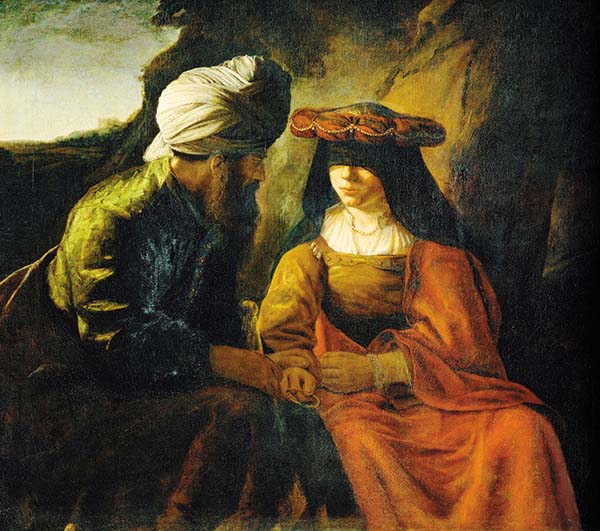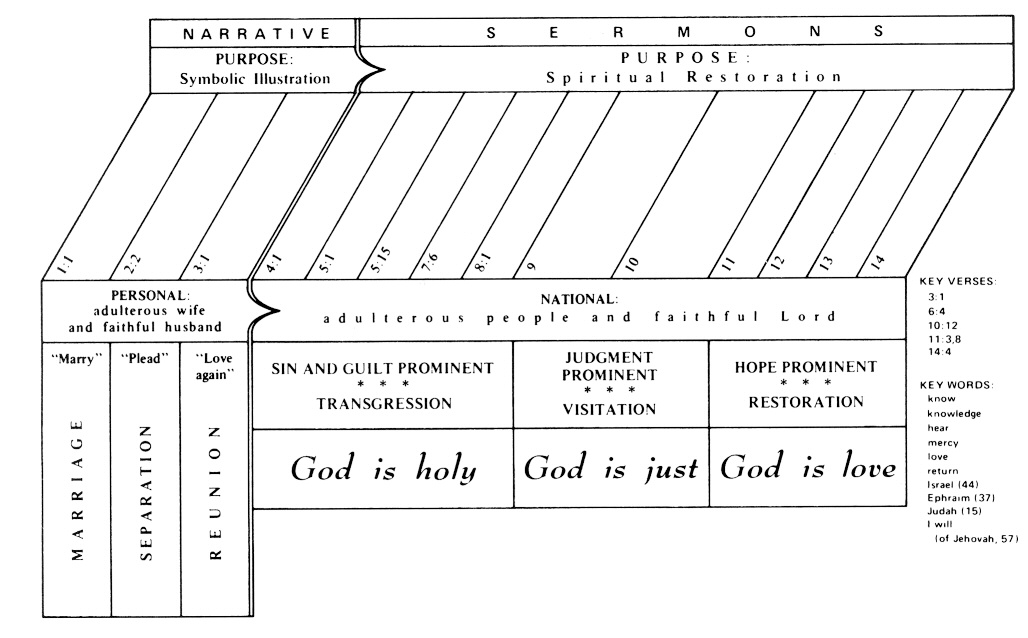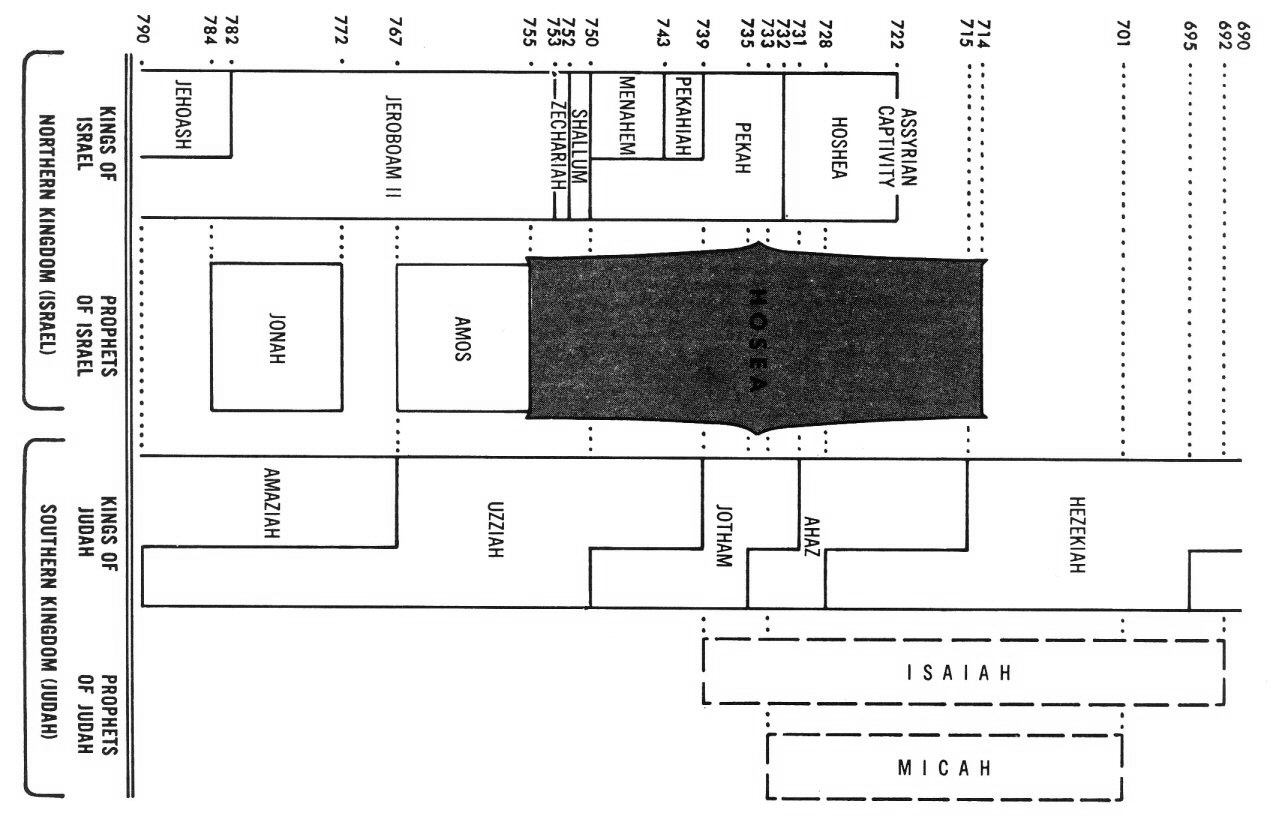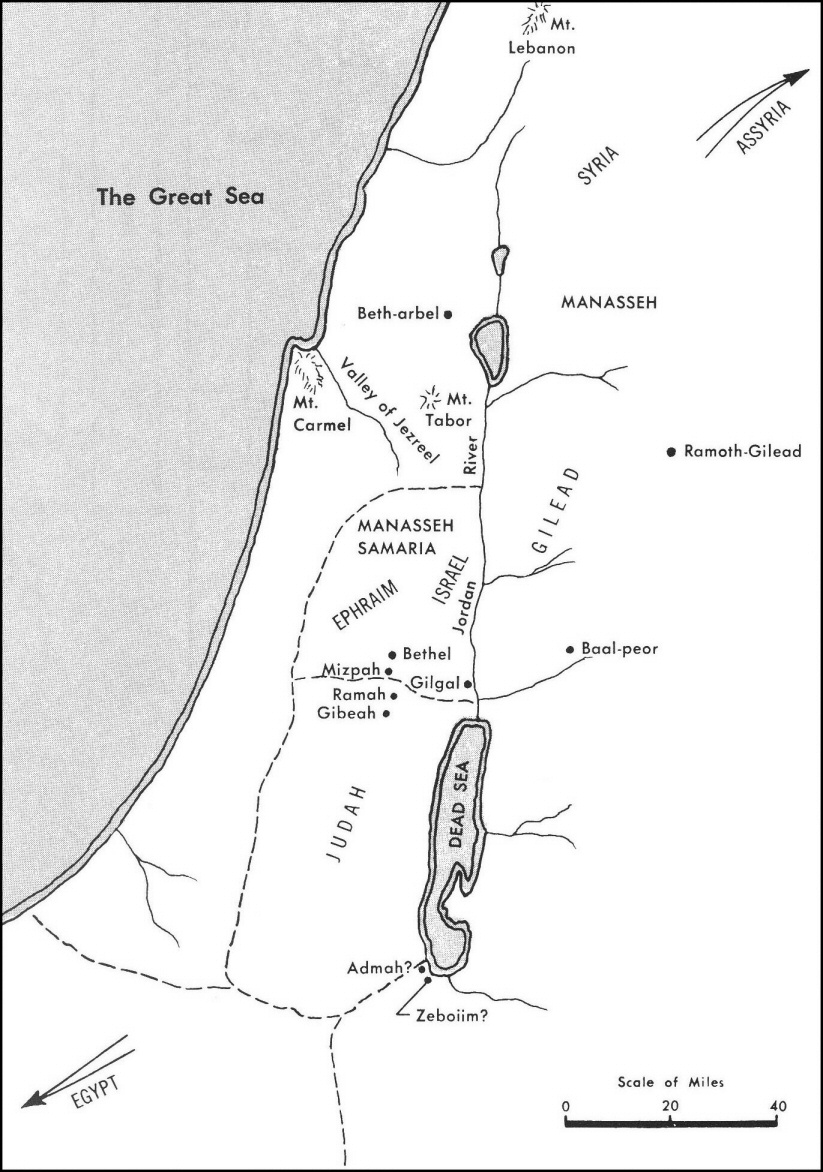
Hosea's Unconditional Love for Gomer

Click chart to enlarge

Click chart to enlarge
Chart from recommended resource Jensen's Survey of the OT - used by permission
OUTLINE OF HOSEA
I. The Prodigal Wife, Hosea 1:1-3:5
A. Her Unfaithfulness, Hosea 1:1-11
B. Her Punishment, Hosea 2:1-13
C. Her Restoration and Israel's, Hosea 2:14-23
D. Her Redemption, Hosea 3:1-5
II. The Prodigal People, Hosea 4:1-14:9
A. The Message of Judgment, Hosea 4:1-10:15
1. The indictment, Hosea 4:1-19
2. The verdict, Hosea 5:1-15
3. The plea of Israel, Hosea 6:1-3
4. The reply of the Lord, Hosea 6:4-11
5. The crimes of Israel, Hosea 7:1-16
6. The prophecy of judgment, Hosea 8:1-10:15
B. The Message of Restoration, Hosea 11:1-14:9
1. God's love for the prodigal people, Hosea 11:1-11
2. God's chastisement of the prodigal people, Hosea 11:12-13:16
3. God's restoration of the prodigal people, Hosea 14:1-9
Ryrie Study Bible
Prophets sometimes do strange things:
- For three years, Isaiah embarrassed people by walking the streets dressed like a prisoner of war: “Naked and barefoot, with their buttocks uncovered, to the shame of Egypt” (Isaiah 20:4). It symbolized the coming desolation and shame of Egypt and Ethiopia at the hands of the Assyrians.
- For several months, Jeremiah carried a yoke on his shoulders. He put his neck in the yoke and his hands in bonds as an object lesson symbolizing that Judah would be in bondage and captivity to Babylon (Jeremiah 27-28).
- The prophet Ezekiel was told to act like a little boy playing war (Ezekiel 4:1-8). He was to make a miniature city of Jerusalem with walls, but also with mounds around it, complete with battering rams, to illustrate Babylon's final coming siege of Jerusalem.
- Ezekiel was to take a sharp barber's razor, cut one-third of his hair and burn it in the midst of the city; cut another one-third and scatter his hair to the wind; cut another one-third and beat it around with the razor; and take a small amount and attach it to his garment. Babylon would come in and punish by fire, others would be dispersed and pursued by death; some would die by pestilence and famine; but there would be a small remaining remnant, some of whom would be subjected to further calamity (Ezekiel 5).
- God told Ezekiel that his wife would die, but he was to make no sound of mourning; he was to shed no tears; and he was to eat no bread of sorrow. It was now too late to preach because judgment had come (Ezekiel 24:15ff).
These men did these peculiar things as acts of mercy. The people of God had become deaf to God's voice and were no longer paying attention to His covenant. The Lord called His servants to do these strange things – these “action sermons” – in hopes that the people would wake up and listen to what they had to say. Only then could the nation escape divine discipline and judgment.
But no prophet preached a more painful “action sermon” than Hosea. He was instructed to marry a prostitute named Gomer who subsequently bore him three children, and he wasn't even sure that he fathered the last two. Then Gomer left him for another man, and Hosea had the humiliating responsibility of buying back his own wife.
What was this all about? It was a vivid picture of what the people of Israel had done to their God by prostituting themselves to idols and committing “spiritual adultery” (James 4:4).
We feel the heartbeat of God possibly more clearly in Hosea than in any other book of the Bible. God “married” Israel at Mount Sinai when they accepted His covenant (Exodus 19-21); and then He grieved over them when they forsook Him for the false gods of the land of Canaan.
Hosea would be commanded by the Lord to marry and love a prostitute even though she would be unfaithful to him as a powerful illustration to the people of Israel concerning their relationship with their Husband, Jehovah. See Isaiah 54:4-6.
Even as the Church is the bride of Christ, Israel is the wife of Jehovah. But Israel had a tragic tendency to prostitute herself by leaving the relationship she had with God in order to pursue other gods. Thus, in Hosea's wife, Gomer, Israel would see an illustration of herself.
Hosea ministered to the ten Northern tribes of Israel from 750 to 714 B.C., which makes him perhaps the longest ministering prophet in the Bible. He ministered through the reigns of the last six kings of the ten Northern tribes and was on the scene when they were invaded by the Assyrians after refusing to heed the Lord's warnings.
Hosea refers to the Northern kingdom as Ephraim constantly. Ephraim was the first of the twelve tribes of Israel to backslide. Hosea is quoted in the New Testament some thirty times.
The Book of Hosea is divided into two major sections:
The Tragedy of Hosea's Home Life Chapters 1-3 (Hosea's Personal Sorrows)
The Tragedy of Hosea's Homeland Chapters 4-14 ( Hosea's Powerful Sermons)
- A Polluted People Chapters 4-7
- A Punished People Chapters 8-10
- A Prized People Chapter 11
- A Pardoned People Chapters 12-14
The Command to Hosea Hosea 1:2
- Here we meet a bit of a problem because not every Bible student agrees on the kind of woman Hosea married. Hosea either married a pure woman who later became a prostitute, or he married a prostitute who bore him three children.
- Why would God instruct Hosea to “take unto thee a wife of whoredom? There are several reasons why God did this.
- By marrying an unfaithful wife, Hosea could, as perhaps no other single prophet, understand somewhat the anguish in God's own heart over the Northern kingdom, whose people were constantly committing spiritual fornication and adultery against Jehovah.
- His own marriage would become a walking and visible example of his message to Israel.
- The names God instructed Hosea to name his children would describe the future punishment and eventually restoration of all Israel.
The Children of Hosea - Gomer's three children were given meaningful names selected by the Lord.
Jezreel Hosea 1:3-5
The name Jezreel means “God sows” or “God scatters.” Jezreel was a city in the tribe of Isaachar, near Mount Gilboa, and is associated with the drastic judgment that Jehu executed on the family of Ahab (2 Kings 9-10). So zealous was Jehu to purge the land of Ahab's evil descendants that he murdered far more people than the Lord commanded, including King Ahaziah of Judah and forty-two of his relatives (2 Kings 9:27-10:14). Through the birth of Hosea's son, God announced that He would avenge the innocent blood shed by Jehu and put an end to Jehu's dynasty in Israel. This was fulfilled in 752 B.C. when Zechariah was assassinated, the great-great-grandson of Jehu and the last of his dynasty to reign. (See 2 Kings 10:30). Naming his son Jezreel (“to scatter”) was also used as an illustration of what would happen in 721 B.C. when the Assyrians decimated the land and the ten Northern tribes scattered, never to be found again. “Break the bow.” The bow was a common euphemism denoting military strength, the principle instrument of warfare in Israel. Fulfillment came in 722 B.C. when Assyria invaded.
Lo-Ruhamah Hosea 1:6-7
Notice in Hosea 1:3 that we are told that Gomer bore Hosea a son. But in Hosea 1:6 we are told that Gomer “bore a daughter;” not that she bore “him” a daughter. The name “Lo-Ruhama” means “not pitied” or “not loved” or she that never knew a father's mercy or love. God had loved His people and proved it in many ways, but now He would withdraw that love and no longer show them mercy. God would bring judgment on Israel and no longer extend His favor towards them.
Lo-Ammi Hosea 1:8-9
“Lo=Ammi” means “not mine” or “not my people.” Again, this son was not born of Hosea. “Not my people” symbolizes God's rejection of Israel. Not only would God remove His mercy from His people, but He would also renounce the covenant He had made with them. It was like a man divorcing his wife and turning his back on her or like a father rejecting his own son (Exodus 4:22; Hosea 11:1).
The Charges of Hosea Hosea 2:2-13
Hosea is preeminently the prophet of love. In spite of Gomer going after other lovers, he wants her back, but he wants her to stop her harlotry if she is going to come back to him. In the same way, “God is love” (I John 4:8, 16), but we are also reminded that “God is light, and in Him is no darkness at all” (I John 1:5). God's love is a holy love that does not condone sin or pamper sinners.Hosea focuses on two particular sins:
Idolatry Hosea 2:2-5a
In Hosea 2:2 Hosea asked Gomer's children to confront their mother concerning her unfaithfulness; to rebuke her for her unfaithfulness; to bring charges against her; to plead with her and try to reason with her – but it does no good. She thinks her lovers are providing for all her needs and desires, but it is actually Hosea who is providing for her. Unfaithfulness to the Lord is a serious sin. Just as Israel was tempted to forsake God for idols, the Church is tempted to turn to the world system that hates God and wants nothing to do with God. We must be careful not to love the world (I John 2:15-17), be friendly with the world (James 4:4), become spotted by the world (James 1:27), or conform to the world (Romans 12:2). The Church must remain true to Jesus Christ the Bridegroom until He returns to take His Bride to the heavenly wedding.
Ingratitude Hosea 2:5b-9
Instead of thanking the true God for His blessings of food, water, and clothing, the nation thanked the false gods and used those gifts to serve idols.
The Care of Hosea Hosea 2:14-3:5
Here is a beautiful picture of the grace and mercy of God. He says, “I will allure her.” God will restore Israel to Himself by wooing her. Though they have rejected His love, He will love her more until she is restored. God tells Hosea to go and find Gomer and restore her and treat her as though she were pure and faithful (Hosea 3:1). Hosea finds her on the slave block. Immorality has taken its toll on her. She is used up now by her lovers and they want nothing to do with her. She is no longer beautiful; now she has wrinkles, baggy eyes, tangled hair, tattered clothes. Like a piece of garbage, now her lovers cast her aside. Hosea buys her from the slave market and paid fifteen pieces of silver for her – half the price of a slave. He also gives a homer and a half of barley, which was half the ration given to a cow for a day.
God is saying, “I am not giving up or walking out. Instead, I am reaching out because My love is absolutely unchangeable.”
We need to remember that God has purchased us at the tremendous cost of the precious blood of His only Son (I Peter 1:18-19).
The Book of Hosea can be divided into two parts:
1. Hosea's Personal Sorrows Chapters 1-3
2. Hosea's Powerful Sermons Chapters 4-14
God instructed Hosea to marry a woman, Gomer, who would become “a wife of whoredom” (a prostitute) and she would bear children of whoredom: for the ten Northern tribes had committed great whoredom in departing from the Lord (Hosea 1:2). Three children would be born in the family; only one would be his child; the other two were the children of Gomer's “lovers.”
Hosea experienced in his life the broken heart that comes from unfaithfulness. Hosea was to preach to a people who had been unfaithful to God. God saw Israel as His “wife” who had promised to be faithful to Him, but who had played the harlot in turning to other lovers; other gods.
Israel had become a Polluted People (Hosea 4-7); they would be a Punished People (Hosea 8-10); but then, in grace and mercy, they would become a Pardoned People (Hosea 11-14).
It is helpful to know that Hosea often calls the ten Northern tribes Israel or Ephraim.
There are five things Hosea says about unfaithful Ephraim:
I. Ephraim Denounced Hosea 4-5
Hosea 4 is a courtroom scene. God Himself brings the charges or the indictment against Israel (Hosea 4:1-3). God brings a “controversy” (KJV) or a charge, a legal complaint, a complaint, a personal quarrel, a lawsuit against Israel. God charges the nation with breach of covenant. They had promised to love God only, to follow His commandments, and faithfulness unto Him. But just as Gomer didn't take her marriage vows seriously but went to live with another man, so Israel reneged on her promises to God and turned to pagan gods.
In Hosea 4:2 God charges them with breaking five of the Ten Commandments: “swearing (or cursing, which does not refer to improper speech, but invoking God's Name and violating the third commandment), lying, killing or murder, stealing, and committing adultery.
Hosea focuses on three sins:
A. Ignorance Hosea 4:6
When Jeroboam the First set up his own religious system in Israel, many of the true priest fled to Judah; so the king ordained priest of his own choosing (2 Chronicle 11:13-15). Of course, these counterfeit priest knew neither the Lord nor His law. They were primarily interested in having easy jobs that would provide them with food, clothing, and pleasure, especially opportunities to be with the shrine prostitutes. “Don't blame the people for what's happening,” Hosea said to the corrupt priest, “because they're only following your bad example.”
Worldly and ignorant spiritual leaders produce worldly and ignorant people, and this brings destruction to the land.
The priests' own daughters and daughters-in-law would become shrine prostitutes and commit adultery! Their sins would bring judgment to their families and to the land.
The Lord held these leaders responsible for the people's lack of knowledge. The priests in particular had ignored their duty to communicate the Law of God to the nation, so they would be severely but justly punished.
As punishment for their rejection of knowledge, the priests themselves would be removed from their office by the Lord.
B. Idolatry Hosea 4:12-13, 17
The people engaged in pagan worship practices, including divination by asking guidance from their wooden idols and using different kinds of rods to make decisions.
Note Hosea 4:17. The Hebrew word translated “joined” literally means “fascinated.” Therefore, God would leave Israel to the consequences of her choice.
“Leave him alone” (verse 17). There is a note of finality. If a man continues in a backslidden condition, refusing to listen to God, there will come a day when God will no longer speak to him or deal with him. The worse thing that God can do to a man or a woman is to leave them alone.
C. Immorality Hosea 5:3
The guilt of the nation as a whole is defiled, corrupt, or unclean. Israel could not hide its sin from the omniscient God.
The saddest thing is that Israel didn't even know what spiritual condition they were in. Like Samson who knew not that the Spirit of God had departed from him, Israel did not realize – or care – that God was not in the picture. Materially they were in great shape, but morally they were rotten to the core and they didn't know it. Hosea 7:9
II. Ephraim Described Hosea 6 – 10
A. Their love for the Lord was like a morning cloud and the dew – Hosea 6:4.
Israel's devotion to the Lord was temporary, lovely but not lasting. Like the early morning fog or dew, any expression of loyalty quickly evaporated.
God doesn't want our relationship with Him to be one of shallow, transient feelings and empty words and rituals, hearts that are enthusiastic one day and cold the next. “For I desire mercy (loyal love) and not sacrifice, and the knowledge of God more than burnt offerings” (Hosea 6:6).
B. Their passion for sin was like a fire in an oven – Hosea 7:4, 6.
Desire for sin can smolder like fire in an oven and blaze forth when the opportunity comes. They had formerly kept their sin under cover, but now they are like an open oven, now with passion.
If we have “burning desires,” we had better be sure they are under God's control or they may destroy us.
C. They are like a half-baked cake – Hosea 7:8.
In that day they cooked on top of hot rocks and made little cakes like our pancakes. You know that a pancake that is not turned can be burned on the one side and raw on the other side. That's the picture of Ephraim. The nation was hot on one side and burned, but raw on the other side.
They blew hot and cold toward God. The story is told of a man who had been wandering through the woods and came upon a house. As the man was invited into the house and out of the cold, he began to blow on his hands. “Why do you blow on your hands?' asked the host. “To make them warm,” answered the guest. Then the host offered the guest a bowl of hot soup and the man began to blow on the soup. “Why do you blow on the soup?” asked the host. “To make it cool,” answered the guest. So the host jumped up and ran out of his house saying, “I don't like anybody who can blow hot and cold.”
That's the way many people are as far as Christianity is concerned. With one crowd they blow hot and with another crowd they blow cold. They are like Ephraim – a cake (pancake) not turned.
D. They were like a “silly dove” – Hosea 7:11
In their foreign policy, the officials flitted between Egypt and Assyria, playing one against the other. She refused to run to God for help. So first she ran down to Egypt for help, and when Egypt wouldn't give her the help she wanted, she went up to Assyria and asked for help. She went back and forth like a silly dove. Eventually the nation was trapped. Instead of trusting the Lord and obeying His Word, they depended on politics and filed.
E. They were like a “Deceitful Bow” – Hosea 7:16
A faulty bow is not dependable. You can't depend on it. It was deceitful. God couldn't depend on His people. They sinned against Him, they were not faithful to Him, they lied to Him, they did not profit from His discipline. He tried to straighten them out, but they preferred to be substandard.
In the battle against evil, are you a weapon that God can depend on?
F. They had become like a “Broken Pot” – Hosea 8:8
Israel had become like a piece of junk pottery on the trash heap. She was a useless vessel “in which no one delights.” Their compromise had so cheapened them that Israel was of no value to the community of nations. Nobody feared them, nobody courted them, nobody wanted them.
G. They were like a Stupid Donkey – Hosea 8:9
Like a long-eared, stubborn donkey, Israel balked against God and ran after Assyria. She was like a dumb animal that had lost its way in the wilderness. Israel had forsaken her God, and she had been forsaken by her allies, so she was abandoned to face a terrible future alone.
H. They were like a “Dried up Root” – Hosea 9:16
Ephraim was once a symbol of fruitfulness; now she was lifeless with no hope of being fruitful.
III. Ephraim Disciplined
Hosea 8:7. The Law of the Harvest is always in effect:
- You reap what you sow.
- You reap latter than you sow.
- You reap more than you sow.
Hosea 10:13 – Israel plowed wickedness, so she would reap iniquity.
“In our day, regardless of what political party you are talking about, a sinful, godless people cannot elect a righteous leader. If the people are liars, they will get a liar as a leader. If they are adulterers, they will get an adulterer. You cannot gamble with God without losing. When you sow sin, you will reap sin. This is inescapable,. If you think that you can escape the results of sin, you are making God out a liar and the Bible a falsehood. No one has ever gotten by with sin and no one ever will.” (J. Vernon McGee).
Hosea explains how the discipline will come:
1. “I will make her like a wilderness.” Hosea 2:3
2. “I will hedge up your way with thorns.” Hosea 2:6
3. “My people are destroyed for lack of knowledge.” Hosea 4:6
4. “Ephraim is joined to idols, Let him alone.” Hosea 4:17
5. “The calf of Samaria shall be broken to pieces.” Hosea 8:6
6. “They sow the wind, and reap the whirlwind.” Hosea 8:7
7. There will be “no birth, no pregnancy, and no conception” Hosea 9:11
8. “I will meet them like a bear deprived of her cubs; I will tear apart their rib cage, I will devour them like a lion, the wild beast shall tear them.” Hosea 13:8
IV. Ephraim Desired
In spite of Israel's wickedness and unfaithfulness, God still loved her and wanted her to repent so that He could restore her.
1. Hosea 6:1-3 – This is a call to repentance. God had to discipline Israel because she sinned, but He would “heal” her. He would “bind her up,” if only she would return to the Lord.
2. Hosea 11:1, 3-4, 8-9
3. Hosea 14:1-4, 9
Hosea 14:8 is one of the most wonderful verses in the Bible. This is a victory song. “Ephraim shall say” – this is future. God is finally going to win. Love is going to win the victory here. God had said to Ephraim, “Oh, Ephraim, how shall I give you up?” and He said, “Ephraim – let him alone because he has turned to idols.” Now God says, “But there is coming a day when Ephraim will see that she made a great blunder and mistake, and she will turn back to Me. She is going to say, 'I will have nothing more to do with idols.'”
